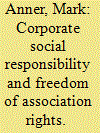|
|
|
Sort Order |
|
|
|
Items / Page
|
|
|
|
|
|
|
| Srl | Item |
| 1 |
ID:
115710


|
|
|
|
|
| Publication |
2012.
|
| Summary/Abstract |
Corporations have increasingly turned to voluntary, multi-stakeholder governance programs to monitor workers' rights and standards in global supply chains. This article argues that the emphasis of these programs varies significantly depending on stakeholder involvement and issue areas under examination. Corporate-influenced programs are more likely to emphasize detection of violations of minimal standards in the areas of wages, hours, and occupational safety and health because focusing on these issues provides corporations with legitimacy and reduces the risks of uncertainty created by activist campaigns. In contrast, these programs are less likely to emphasize workers' rights to form democratic and independent unions, bargain, and strike because these rights are perceived as lessening managerial control without providing firms with significant reputational value. This argument is explored by coding 805 factory audits of the Fair Labor Association between 2002 and 2010, followed by case studies of Russell Athletic in Honduras, Apple in China, and worker rights monitoring in Vietnam.
|
|
|
|
|
|
|
|
|
|
|
|
|
|
|
|
| 2 |
ID:
115708


|
|
|
|
|
| Publication |
2012.
|
| Summary/Abstract |
What explains Germany's exceptional labor market performance during the Great Recession of 2008-09? Contrary to accounts that emphasize employment protection legislation or government policy (i.e., short-time work), this article argues that actions by firms-embedded in ever-changing coordinative institutional structures-were crucial. Firms chose to keep rather than shed labor, a strategy induced by (i) a "toolkit" of flexible labor market instruments that had evolved incrementally over the past thirty years; (ii) wage restraint and successful internal restructuring of firms during the past decade, which fueled an export boom before the crisis. Firms thus had some margin for maneuver, using internal flexibility to protect their investment in skilled workers. These and other institutional changes driven by firms reflect a process of successful adaptation to external economic challenges, but did not fundamentally undermine Germany's coordinated form of capitalism. The result is not a new German model that was purposefully designed; instead German firms slowly discovered new ways to cope with economic challenges.
|
|
|
|
|
|
|
|
|
|
|
|
|
|
|
|
| 3 |
ID:
115706


|
|
|
|
|
| Publication |
2012.
|
| Summary/Abstract |
Ethnic violence in Gujarat in 2002 killed at least a thousand Muslims. Compiling data from the Times of India, we investigate variation across 216 towns and rural areas. Analysis reveals the political logic of violence. Killing was less likely where the Hindu nationalist Bharatiya Janata Party (BJP) was weakest, but was even less likely where the BJP was strong; it was most likely where the party faced the greatest electoral competition. Underemployment and Muslim in-migration also increased violence. The political logic is confirmed by analysis of the subsequent election: the BJP's vote increased most in districts with the worst violence. Police chiefs in districts where violence was severe were more likely to be promoted.
|
|
|
|
|
|
|
|
|
|
|
|
|
|
|
|
| 4 |
ID:
115709


|
|
|
|
|
| Publication |
2012.
|
| Summary/Abstract |
This paper examines the globalization process of German core export metalworking industries, to show how the globalization of national corporations has different effects on domestic economies. Contrary to the prevalent views on the globalization of production, this paper holds that the outcomes and patterns of globalization vary, due mainly to the politics of the main actors inside and outside corporations. This paper compares Germany's negotiated globalization with U.S. employer unilateralism. In most U.S. corporations, employers decide how to globalize based on the short-term perspective of shareholder value. By contrast, in Germany, main industrial actors-including employers, works councils, and trade unions-collectively negotiate how to globalize. In this conflict-laden process of collective negotiation, German actors have created a political compromise that combines the upgrading of domestic production with globalizing overseas, whereas Americans have failed to do so. Furthermore, this paper emphasizes that divergent patterns of globalization are not predetermined by national institutions. To the contrary, the successful outcomes in German globalization come mainly from actors' proactive readjustments in their traditional model of industrial relations, creating new practices, such as active union involvement in company-level bargaining, and the democratic bottom-up process instead of the traditional top-down process of negotiation.
|
|
|
|
|
|
|
|
|
|
|
|
|
|
|
|
| 5 |
ID:
115707


|
|
|
|
|
| Publication |
2012.
|
| Summary/Abstract |
Can we argue that pressures generated from grassroots politics are responsible for the rapid expansion and ethnically/racially uneven distribution of social assistance programs in emerging economies? This article analyzes the Turkish case and shows that social assistance programs in Turkey are directed disproportionately to the Kurdish minority and to the Kurdish region of Turkey, especially to the internally displaced Kurds in urban and metropolitan areas. The article analyzes a cross-sectional dataset generated by a 10,386-informant stratified random sampling survey and controls for possibly intervening socioeconomic factors and neighborhood-level fixed-effects. The results show that high ethnic disparity in social assistance is not due to higher poverty among Kurds. Rather, Kurdish ethnic identity is the main determinant of the access to social assistance. This result yields substantive support to argue that the Turkish government uses social assistance to contain the Kurdish unrest in Turkey. The Turkish government seems to give social assistance not simply where the people become poor, but where the poor become politicized. This provides support for Fox Piven and Cloward's thesis that relief for the poor is driven by social unrest, rather than social need. The article concludes that similar hypotheses may hold true for other emerging economies, where similar types of social assistance programs have recently expanded significantly and have been directed to ethnic/racial groups.
|
|
|
|
|
|
|
|
|
|
|
|
|
|
|
|
|
|
|
|
|